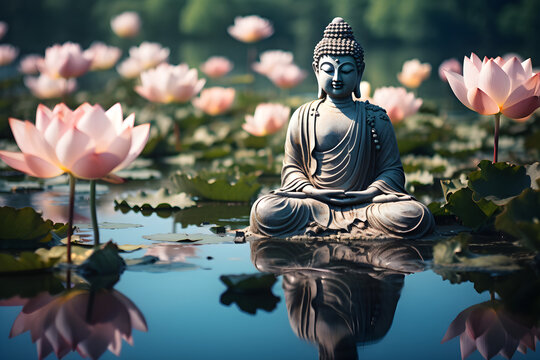In a world simultaneously connected through and plagued by social media, silence is becoming an ever-appreciating commodity.
The monk’s gentle voice ebbed as he rang a large bronze bell, the first of three “dings” signalling us to settle onto our cushions. I took one last glance at the September sunrise spilling onto the magenta orchids of the Buddha altar, bringing dimension to the otherwise dimly lit room. The interplay of fragrant incense weaving through the sun’s golden rays created an ambiance of complete serenity in the Great Togetherness Meditation Hall. A calligraphy banner above the altar read, “This Is It” – reminding me that the present moment is all we have.
The banner echoed the words of Zen master Thich Nhat Hanh (“Thay”): our true home is in the present moment. This present moment was my last day at the Blue Cliff Monastery in New York State. The monastery, located in the Catskill Mountains two hours from New York City, is one of 11 global mindfulness centres established by Thay, a Zen Buddhist monk exiled from Vietnam in 1966 for opposing the war. Called “an Apostle of peace and nonviolence” by Martin Luther King Jr, Thay was a preeminent figure in bringing Engaged Buddhism and mindfulness to the West.
Now, surrounded by dozens of monks, nuns and fellow retreat-goers, I – finally – felt at ease, as if I was truly home. At the sound of the third “ding”, I closed my eyes, took a deep breath and settled into my cushion.
Mindfulness retreats, which span everything from Buddhist meditation retreats like the one I was on to beachside yoga retreats, are becoming increasingly popular as people seek to disconnect. “We’re now seeing more people wanting to host retreats – they’re becoming more mainstream,” explained Sofiah Thom, owner of Danyasa Eco-Retreat in Dominical, Costa Rica.
Disconnecting from the outside world to prioritise her health is exactly why Shannon Lutz, a New York business professional, attends mindfulness retreats. Having attended retreats at both Blue Cliff and Danyasa, Lutz enjoys the “silence and calming benefits” these retreats instill by encouraging attendees to shut off their phones.
Today, there are an estimated five billion social media users globally, with the average person spending more than 2.5 hours on social media each day. A recent report from UC Davis explains that while social media can make us feel connected, it also has a “dark side“, fuelling anxiety, depression and loneliness. In fact, the US Surgeon General issued an opinion in June calling for a warning label on social media platforms for adolescents. However, as Dr Edward Brodkin, associate professor of psychiatry and a neuroscientist at the University of Pennsylvania, points out, “social media is impacting us all. It draws us into a virtual world of screens and away from direct interaction with others.”
As a traveller who has always lived in bustling cities – New York, London, Montreal – the cacophony of urban life, smartphone notifications and social media makes it easy for me to lose focus. This was my fifth Blue Cliff retreat since 2016, and each time I am refreshed by the silence and reflective discussion that help me relax and become mindful of the present moment. Here, 14-hour daily silent periods are followed by small group talks where monastics offer retreat-goers techniques to stay present. Simple gathas like “breathing in, there is only this present moment; breathing out, it is a wonderful moment” help focus attention both on and off the cushion.
The aim of mindfulness retreats is to provide the space to cultivate habits that help us become more present. They range in form and may focus on meditation, yoga, spiritual reflection or general health and wellness. What they all have in common is that they typically incorporate periods of silence, healthy eating, mentorship, breathwork and nature, and have become increasingly popular as people adopt healthier lifestyles.
According to research firm Allied Market Research, the global wellness retreat market (which includes mindfulness retreats) is set to double by 2032, reaching $364bn, with demand driven by increased stress, a growing consciousness surrounding wellness and a “desire for digital detoxification”. Silent travel was specifically named as one of Condé Nast Traveler’s top trends for 2024, noting its “promising implications for wellbeing”.


